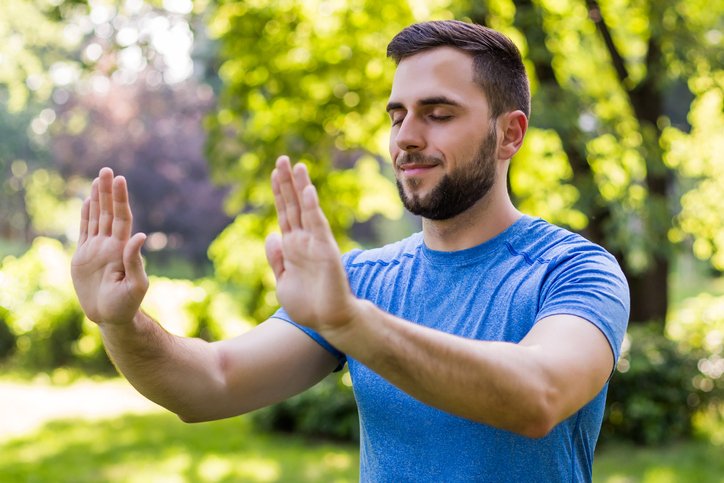Finding Your Zen: How to Choose between Yoga and Qigong
Introduction to Qigong and Yoga
In today's fast-paced world, finding ways to reduce stress, improve mental clarity, and maintain a healthy body is essential to overall well-being. Two popular practices that can help you achieve these goals are Qigong and Yoga. While both have their roots in ancient Eastern traditions, they have grown in popularity in Western societies due to their numerous health benefits and ability to create inner peace and balance.
Qigong (pronounced chee-gung) is an ancient Chinese practice that combines physical movements, controlled breathing, and meditation to cultivate and balance the body's vital energy, or "qi." It is often used for healing, general health maintenance, and spiritual growth. On the other hand, Yoga, which originated in India, is a comprehensive practice that encompasses physical postures (asanas), breath control (pranayama), and meditation to promote overall well-being and spiritual growth.
As you begin your journey into these practices, it's essential to understand their origins, histories, and key differences, as well as the benefits they offer. This article will provide a comprehensive guide to help you decide whether Qigong or Yoga is the right choice for you.
The Origins and History of Qigong and Yoga
Qigong is said to have originated 4,000 – 5,000 years ago and was initially developed as a means of self-preservation and self-improvement. Ancient Chinese sages believed that by cultivating their qi, they could enhance their physical strength, mental clarity, and spiritual growth. Over time, Qigong evolved to include various styles and techniques, with some focusing more on martial arts, while others emphasized meditation and spiritual growth.
Yoga, on the other hand, has a history that spans at least 5,000 years. This ancient Indian practice was initially developed as a means of achieving spiritual enlightenment and union with the divine. As the practice evolved, it began to incorporate physical postures, breath control, and meditation techniques to promote overall well-being and balance. Today, Yoga has become a popular practice worldwide, with many different styles and approaches.
Understanding the Key Differences Between Qigong and Yoga
While both Qigong and Yoga involve physical movements, breath control, and meditation, there are some key differences between the two practices. Qigong focuses primarily on cultivating and balancing the body's vital energy or "qi." This is accomplished through gentle, flowing movements, deep breathing, and visualization techniques. Qigong also emphasizes the importance of maintaining a relaxed state of mind and body throughout the practice.
In contrast, Yoga places a greater emphasis on physical postures and alignment. These postures, or asanas, are designed to stretch and strengthen the body while promoting relaxation and mental clarity. Pranayama, or breath control, is another vital aspect of Yoga that helps to calm the mind and balance the body's energy systems. Additionally, Yoga often includes ethical guidelines and philosophical teachings, which can help practitioners develop a deeper sense of purpose and meaning in their lives.
Health Benefits of Practicing Qigong and Yoga
Both Qigong and Yoga offer numerous health benefits, making them excellent choices for those looking to improve their overall well-being. Some of the shared benefits of both practices include:
1. Stress reduction: By promoting relaxation and mental clarity, both Qigong and Yoga can help reduce stress levels and improve overall mental health.
2. Improved cardiovascular health: Both practices have been shown to lower blood pressure, improve heart rate variability, and increase circulation.
3. Enhanced immune function: Regular practice of Qigong and Yoga has been linked to improved immune system function and a reduced risk of illness.
4. Increased flexibility and strength: Both practices involve physical movements that help to stretch and strengthen the body, improving overall flexibility and strength.
5. Better sleep: By promoting relaxation and reducing stress, both Qigong and Yoga can help improve sleep quality and duration.
Qigong vs. Yoga: Which is Best for Stress Relief?
When it comes to stress relief, both Qigong and Yoga have a lot to offer. Qigong's gentle, flowing movements and focus on cultivating and balancing the body's vital energy make it an excellent choice for those seeking to unwind and relax. In addition, the visualization techniques used in Qigong can help to calm the mind and alleviate stress.
Yoga, with its focus on physical postures and breath control, can also be highly effective in reducing stress. The practice of Yoga encourages mindfulness and a deeper connection to the body, which can help to create a sense of inner peace and balance. Additionally, many Yoga styles incorporate meditation or relaxation techniques, further promoting stress reduction.
Ultimately, the best choice for stress relief will depend on your personal preferences and what resonates with you. Some individuals may find the gentle movements of Qigong more soothing, while others may prefer the physical challenge and mental focus that Yoga provides.
Qigong vs. Yoga: Which is Best for Flexibility and Strength?
Both Qigong and Yoga can help to improve flexibility and strength. Qigong's flowing movements work to open and stretch the body, promoting flexibility and mobility. Additionally, the practice of Qigong encourages the development of deep, internal strength by focusing on the cultivation and balancing of vital energy.
Yoga, with its emphasis on physical postures and alignment, is known for its ability to improve flexibility and strength. The various asanas in Yoga work to stretch and strengthen the body, targeting specific muscle groups and joints. Additionally, many Yoga postures require the practitioner to engage their core muscles, promoting overall strength and stability.
While both practices can improve flexibility and strength, Yoga may be more appealing to those looking for a more physically challenging practice. However, it's essential to remember that Qigong can still provide significant benefits in these areas, especially when practiced consistently over time.
Qigong vs. Yoga: Which is Best for Mental Clarity and Focus?
Both Qigong and Yoga can help to improve mental clarity and focus. Qigong's emphasis on deep breathing and visualization techniques works to calm the mind and enhance concentration. Additionally, the practice of Qigong encourages a relaxed state of mind and body, which can help to alleviate mental distractions and improve overall focus.
Yoga, with its focus on physical postures and breath control, can also promote mental clarity and focus. The practice of Yoga encourages mindfulness and a deeper connection to the body, which can help to create a sense of inner peace and balance. Additionally, many Yoga styles incorporate meditation, further promoting mental clarity.
When deciding which practice is best for mental clarity and focus, consider your personal preferences and learning style. Some individuals may find the visualization techniques used in Qigong more conducive to mental clarity, while others may prefer the physical challenge and mental focus that Yoga provides.
How to Choose the Right Practice for Your Lifestyle and Goals
When choosing between Qigong and Yoga, consider your personal goals and lifestyle. If you're looking for a gentle, relaxing practice that emphasizes cultivating and balancing vital energy, Qigong may be an excellent choice for you. On the other hand, if you prefer a more physically challenging practice with a focus on alignment and strength, Yoga may be a better fit.
It's also essential to consider your schedule and the amount of time you're able to dedicate to your practice. Both Qigong and Yoga can be practiced in as little as 15 to 20 minutes per day, but you may find that one practice is more accessible or enjoyable for you based on your individual preferences and needs.
COMBINING QIGONG AND YOGA FOR A BALANCED PRACTICE
Of course, you might also consider combining both Qigong and Yoga into one practice, or practicing both separately.
The slow, flowing movements of Qigong can serve as a warm-up for the more dynamic and challenging postures of Yoga, as well as help to develop a greater sensitivity to the flow of energy within your body, which can further enhance your Yoga practice.
Another option is ‘Tao Yin’, a lesser-known practice from China that predates both Qigong and Yoga. Tao Yin (pronounced dow yin) means ‘to guide and direct the vital principle (Qi) through the body and mind. Sometimes called ‘Taoist Yoga', it includes floor exercises and has more emphasis on stretching and core strengthening than other styles of Qigong.
Practising Yoga (or Tao Yin) in combination with Qigong, can offer a truly balanced practice.
Integrating Qigong and Yoga into Your Daily Routine
Regardless of which practice you choose, consistency is key to reaping the many health benefits offered by Qigong and Yoga. Aim to practice at least a few times per week, gradually increasing the duration and intensity of your sessions as you become more comfortable and proficient.
To integrate either practice into your daily routine, try setting aside specific times each day or week for your practice. This could be in the morning, during a lunch break, or in the evening. Additionally, consider joining a local class or finding an online resource to help guide your practice and keep you motivated.
By incorporating Qigong and/or Yoga into your life, you'll be well on your way to finding your zen and achieving greater overall well-being.
About the author: Kerrie Womersley is a Certified Advanced Holden Qigong Teacher, Advanced Soul Realignment Akashic Records Reader, Emotional Freedom Techniques Practitioner and Certified Infinite Possibilities Trainer.
The Find Yourself Qigong Online Studio is a supportive, sacred space, where Kerrie guides her students - through movement, intention and breathwork - to release stress and anxiety, ground themselves, raise their vibration, and refine their natural intuition to reconnect with their Divine True Nature.
Connect with Kerrie by visiting www.findyourselfnow.com.




